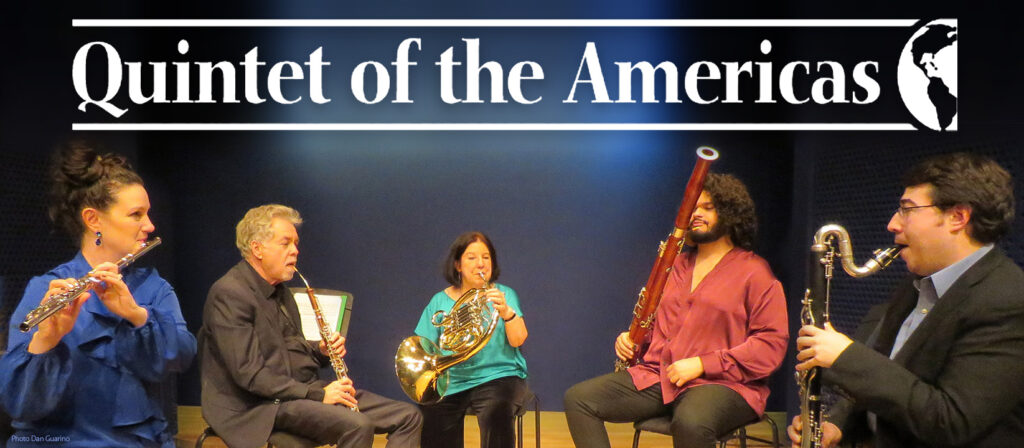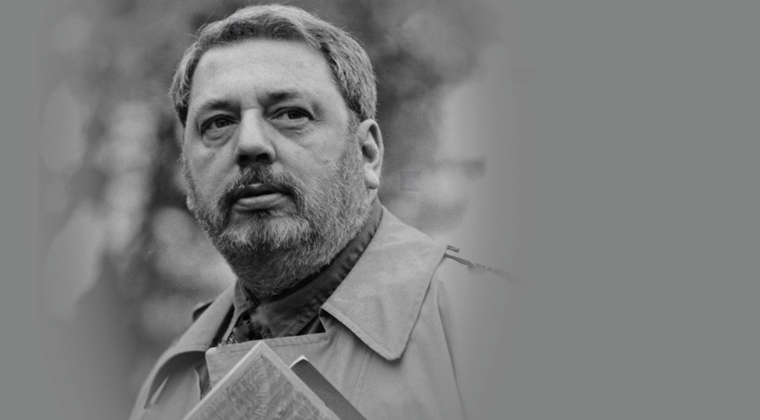Concerto for the New World for Wind Quintet, String Orchestra and Percussion (1991)
Introduction and Thema: Andantino
Variation I: Allegro
Variation II: Larghetto
Variation III: Presto
Variation IV: Moderato
Variation V: Adagio
Variation VI: Scherzo rag
Variation VII: Nobile
Variation VIII e Finale: Allegro molto e baccanàle
Quintet manager, Sandra Elm introduced us to William Thomas McKinley. we were happy to have two pieces written by him for us, both for special occasions. Concerto for the New World was written for us to perform on our Carnegie Hall (Stern Auditorium) debut concert January 9, 1992. The music from this concert was recorded and released on the Discovering the New World CD MMC2018
Durantion: 24′ Publisher: MMC Publications
Nonet for String Quartet and Wind Quintet (2005)
Interlude: Tempestoso
I. Con moto
II. Allegretto semplice
III. Presto vivace
McKinley wrote this Nonet for the Quintet to perform with the Cuarteto Latinoamericano at Weill Hall at Merkin Hall in 2005.
William Thomas McKinley (1938-2015) was a composer whose career reflected a quintessentially American sort of musical eclecticism, evident in a life and work that marries together cultural icons as diverse as Gunther Schuller and Carlton Fisk. Friends and collaborators would know him as a prolific writer, an inspiring teacher, and a gregarious raconteur – all sensibilities that found root in his earliest childhood musical forays. Born in New Kensington, PA to an Irish working-class family distantly related to the namesake twenty-fifth President, McKinley showed a talent for crafting complex piano improvisations soon after beginning lessons on the instrument at the age of six. By the age of ten, he was performing professionally with jazz bands in the Pittsburgh area and was the youngest member of the American Federation of Musicians in the city. Yet while McKinley made his mark as a performer in Pittsburgh, eventually playing with jazz luminaries like Dexter Gordon and Wes Montgomery, he was never satisfied with the creative strictures inherent in the grind of daily dance band gigs. For that reason, when he chose to attend college at nearby Carnegie Tech (now Carnegie-Mellon), McKinley gravitated to composition, studying with Nikolai Lopatnikoff, instead of pursuing a performance degree. True to his eclectic nature, he gained admission in part by improvising a short piece in the style of Chopin.
Beginning his composition studies in 1958, McKinley incorporated Lopatnikoff’s neoclassical leanings into his own interest in jazz improvisation and the melodic elegance of Aaron Copland to form the stylistic basis for his earliest works. The writing born from this forge of influence was well regarded enough to secure a summer fellowship at the Tanglewood Institute and a BMI composition award in 1963, and an invitation from composer Mel Powell to enroll in the graduate program at Yale in 1965. Thrust into a mid-sixties academic environment where the post-war influence of European serialism was king, McKinley began to abandon his earlier style in favor of a modest atonality that he thought would better emphasize his jazz leanings. Powell encouraged this transformation, as did a cadre of Yale performance students like saxophonist Les Thimmig and clarinetist Richard Stoltzman, who would become two of McKinley’s most frequent collaborators in later years. The time spent in New Haven was fruitful, spawning a number of commissions, another summer at Tanglewood, and his first teaching position at SUNY Albany.
By the time he graduated from Yale in 1969, McKinley’s body of work and professional connections allowed him to secure a tenure-track position at the University of Chicago. While well regarded by colleagues, especially fellow composer Ralph Shapey, and despite some inroads as a performer in the city, there were few opportunities for him to cultivate his jazz interests at the institution. So when Gunther Schuller, whom McKinley had studied with at Tanglewood a decade before, offered him a more performance-oriented position at the New England Conservatory in 1973, he jumped at the chance to return east. McKinley would remain at NEC for over twenty years, teaching a variety of advanced jazz music theory and orchestration courses, jazz piano and composition lessons, and mentoring various jazz piano students and ensembles, as well as serving as chair of the Afro-American Music and Jazz Studies department for a brief period. Although at the height of his skills as a jazz pianist, working regularly with many jazz luminaries including Miroslav Vitous, Roy Haines, Eddie Gomez, Gary Peacock, Billy Hart, John Scofield, and others, by the ealy 1980s he committed himself to composition, backing away from the double life as a performer that had provided for him financially since his teenaged years. Instead, McKinley spent his spare time in the mid-1970s pitching for various semi-pro baseball clubs in the Boston area, perfecting a knuckleball and earning an opportunity to pitch batting practice for the Red Sox during the 1975 season.
The move to Boston also ushered in the stylistic emergence of McKinley’s mature compositional period. His growing dissatisfaction with the prevailing strict atonal musical vogue was already evident by dalliances with a limited form of minimalism. During the decade of the 1980s, as the sound of John Williams began to usurp the sound of Milton Babbitt in a neo-tonal, neo-romantic turn, McKinley at last found the means to marry together his love of jazz and concert music into a personal mark. And through this transformation emerged the highest professional accomplishments of his career: the American Academy of Arts and Letters Music Prize in 1983, a Koussevitsky Foundation Commission in 1984, and a Guggenheim Fellowship in 1985. Perhaps nothing reflects this pinnacle better than the composition of two concert works for famed tenor saxophonist Stan Getz in the latter half of the decade, constituting the most tangible marker of marrying the two sides of his musical life together after decades of trying.
Upon retiring from teaching in 1994, McKinley enjoyed the fruits borne of his long and intriguing career. He continued to write chamber and orchestral works for various commissions, teach privately from his Boston area home, and perform jazz at clubs and other venues in the area on occasion. He founded the independent rec0rding company Master Musicians Collective (MMC), providing the kind of outlet for recording and distribution many American concert music composers both inside and outside of academic institutions lacked. And he remained a steadfast keeper of the eclectic reputation developed throughout his long career until the end. At the time of his death, he was working on a commission for the SOLI Ensemble in San Antonio, and premiered posthumously the following year. A review of the performance crafted by critic and photographer Mike Greenberg gave the work a most unique and apropos compliment: “unpredictable as the knuckleball pitches he used to throw.” Indeed, the music McKinley wrote continues to surprise, enthrall, and flutter into our ears with grace of a gentle windup, never ending quite where we might expect.
–Dr. Ryan McCormack, Knoxville TN [October 2021]
for more information on the composer visit

